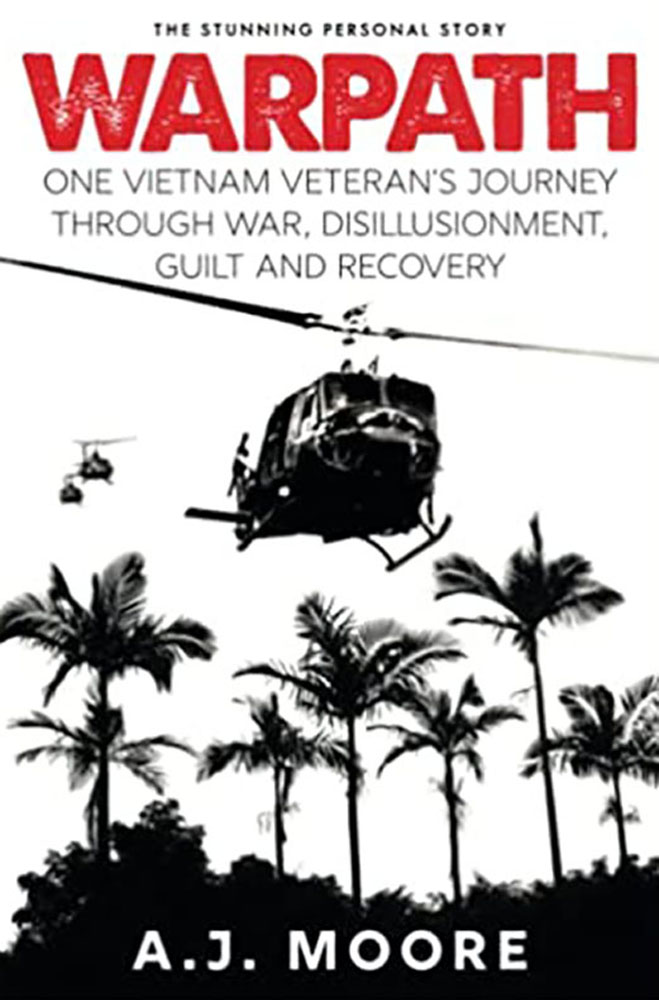 Download PDF of this full issue: v52n2.pdf (36.5 MB)
Download PDF of this full issue: v52n2.pdf (36.5 MB)From Vietnam Veterans Against the War, http://www.vvaw.org/veteran/article/?id=4142
 Download PDF of this full issue: v52n2.pdf (36.5 MB) Download PDF of this full issue: v52n2.pdf (36.5 MB) |
Warpath: One Veteran's Journey Through War, Disillusionment, Guilt, and Recovery
by A.J. Moorey
(Apache Press Books, 2022)
I came to know author A.J., or Al, Moore, when we both agreed to take part in a virtual learning class for senior citizens, put together by fellow authors Mary Reynolds Powell (A World of Hurt) and Doug Bradley (We Gotta Get Out of This Place: The Soundtrack of the Vietnam War). Al had talked about his upcoming book with understandable enthusiasm, and we were all eager to see it. I'm pleased to report that no one was disappointed.
Warpath will inevitably be compared to Bob Mason's Chickenhawk, an unforgettable and landmark book from 1983. Both are memoirs by veterans who fought the Vietnam War from their helicopters. Both became disillusioned with the American conduct of the war, but they overcame their emotions and their consciences to fly day after day. If anything, Warpath supports Mason's conclusions about the futility of the American strategies, the abject terror of war, and especially, the crazy daring that was often required to ensure the safe return of their comrades from the most dangerous of missions. Bob Mason was a pilot on a Huey, the iconic aircraft of the ground war in Southeast Asia, while Al Moore was Crew Chief, or observer, on a Loach, a smaller reconnaissance ship with a prominent bubble up front. The Loach was a quick, maneuverable craft, and its job was to act as a scout and find the bad guys. It was equipped with a minigun operated by the pilot, and the Crew Chief's M-16. Loaches flew in pairs, the lead ship and the wing ship hovering above, watching for enemy activity while the lead ship flew very low and very slow, zig-zagging, while they looked for signs of enemy activity such as trash, discarded equipment, foxholes, booby traps tunnel entrances, remnants of cooking fires, and, although I find this difficult to imagine, footprints! Seems to me they had to be flying really low to see footprints in the jungle, but Moore insists it is true. A key component of the search was learning to judge how old the signs might be. Taking fire was considered a very immediate indication!
In the first seven months of 1969, Al Moore logged 147 hours of combat flight time. As his tour of duty stretched on, he began to recognize the futility of what they were doing. They had witnessed too many instances where the ARVN's (Army of the Republic of Vietnam) lack of aggressiveness or commitment meant a less-successful mission than anticipated. Sometimes, that lack of commitment put our American troops in an especially dangerous situation, or worse. However, the next day the Scout crews were expected to climb aboard their ships and head off looking for action. The lower-ranking men (Moore was an E-5) couldn't help but see that many of their NCOs and officers had no idea what it was like to fly into enemy territory every day in hopes of being shot at, and they didn't want to know. Still, they had rank, which translated to authority, and their orders could put the entire team's lives in jeopardy. As many readers of this newspaper will know, part of the challenge of surviving in Vietnam was to find creative ways to ignore a ranking asshole's orders.
Al Moore rotated out of Vietnam in July of 1969 and was assigned to Fort Knox in Kentucky. He got married, lived in an apartment near the base, and worried about his future. And, he refused to re-enlist! "I simply could not tolerate an environment in which rank outweighed competence and where so many of the career soldiers did everything they could to express their lack of respect for their subordinates."
Al Moore earned a college degree and enjoyed a successful career. In addition, he suffered from nightmares and all the other symptoms of PTSD. In writing Warpath, he feels he has overcome PTSD. In my opinion, he has created an extremely well-written and very worthwhile book. I have purposefully left out his accounts of desperate combat situations, but they are vivid and realistic. Still, Al Moore's message is one of deep disappointment in his country's ill-conceived actions in Vietnam and the actions of the army's career professionals. His patriotism was severely wounded in Vietnam, and that is a very worthwhile message. We can only hope a few young people contemplating enlisting in our country's military will read Warpath and think it through.
John Ketwig is a lifetime member of VVAW, and the author of the best-selling memoir ?and a hard rain fell: A G.I.'s True Story of the War in Vietnam, and Vietnam Reconsidered: The War, the Times, and Why They Matter.

|